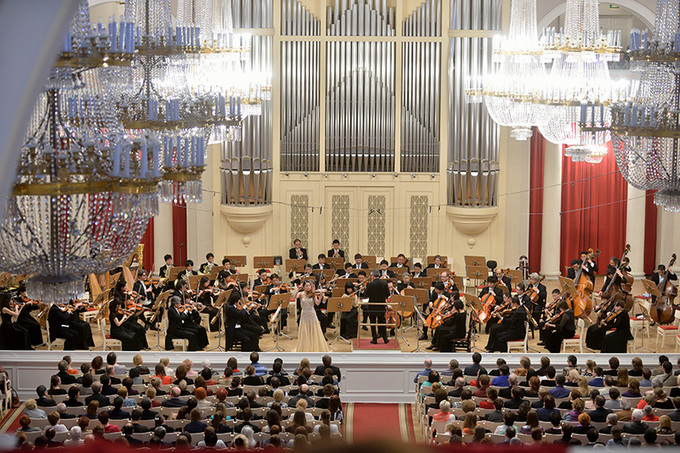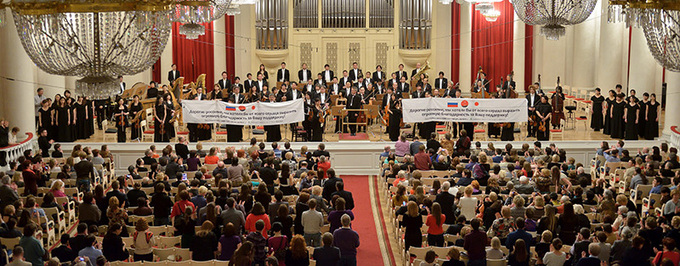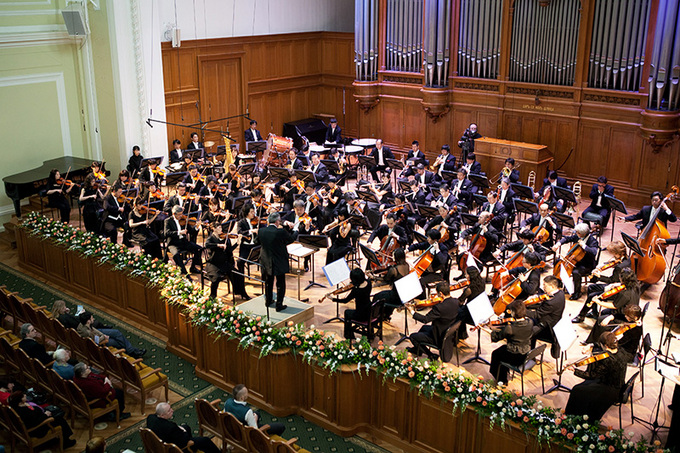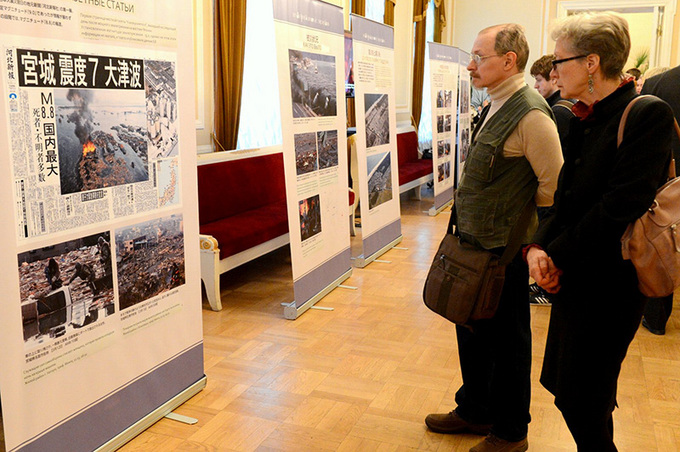A Musical "Thank You" from the Disaster-Stricken Area --Sendai Philharmonic Orchestra to Tour in Russia, Expressing Gratitude for Support in the Aftermath of the 2011 Earthquake
Shuntaro Kanno
Kahoku Shimpo Publishing Company
The Sendai Philharmonic Orchestra (SPO) embarked on a concert tour in Russia from March 27 to 31, 2013, to express Japan's gratitude for the tremendous support, both material and emotional, it received from countries around the world in the months following the March 2011 Great East Japan Earthquake. This article reports on the tour, which was organized by the Japan Foundation and consisted of three performances--one in St. Petersburg and two in Moscow. The SPO also made a friendly visit to a school located in a Moscow suburb on April 1, and performed music for the students there.
Before the Russia tour, the orchestra had had to face enormous challenges presented by the disaster. The SPO was forced to suspend all activities temporarily right after the events of March 11, 2011, as most of the concert halls in the area were closed.
For all the hardship they endured, the SPO still managed to give a charity concert just two weeks after the disaster. On March 26, 2013, some 30 members gathered to perform at Kenzuiji in the Miyagino district of Sendai City, a temple run by the orchestra's deputy director Yoshikazu Kataoka. About 100 people came to listen to their performance. "The people and communities in the area have always supported us," said the SPO members, "We wanted to do something to return the favor."
This became the beginning of the SPO's "recovery concerts." Then, the orchestra, in collaboration with musicians living in Sendai, established the Center for Recovery through the Power of Music, aiming to undertake initiatives such as calling for volunteers to help with reconstruction and requesting and coordinating donations. The SPO has been continuously active since, having performed well over 280 concerts in various locations affected by the disaster, including shelters and shopping districts across Sendai.
The orchestra's heart-warming music has offered consolation, encouragement and strength to those devastated by the disaster. One of the earthquake victims said, "I was finally able to cry for the first time since the quake when I heard them play." The power of music apparently offers benefits that are beyond words.
The Japan Foundation, an organization that engages in international cultural exchange activities, highly appreciated the SPO's efforts and helped pave the way for the orchestra's premier overseas tour. Russia was selected as the performance site in view of its links with the communities in the area and the SPO: Approximately 160 members of the Russian search and rescue team was dispatched to the Ishinomaki area just days after the quake and tsunami hit, and the St. Petersburg Philharmonic Orchestra had raised and sent donations to the SPO.
The press conferences held before the shows in St. Petersburg and in Moscow were attended by a good number of local newspaper, television and magazine reporters. This illustrated the country's strong interest in the activities of the orchestra from the disaster-stricken area, and the media coverage was favorable.
The tour opened with the concert on March 27, 2013, at the St. Petersburg Philharmonic Orchestra Grand Hall, the home of the St. Petersburg Phil led by Artistic Director Yuri Temirkanov. All 1,500 seats were filled at the moment the doors opened, and some people were even standing in the aisles.
The program started with Requiem for Strings composed by Toru Takemitsu, a piece that was selected to express condolences to all victims of the disaster. The next was Pyotr Ilyich Tchaikovsky's Concerto for Violin and Orchestra, which was performed with the violin soloist Mayuko Kamio, the first prize winner of the 2007 International Tchaikovsky Competition. The smooth and crisp sound of Kamio's violin was supported and enhanced by the orchestra. The part I found particularly striking was in the third movement where the solo violin and the string and wind sections of the orchestra were playing passionately, as though vying to outdo each other.
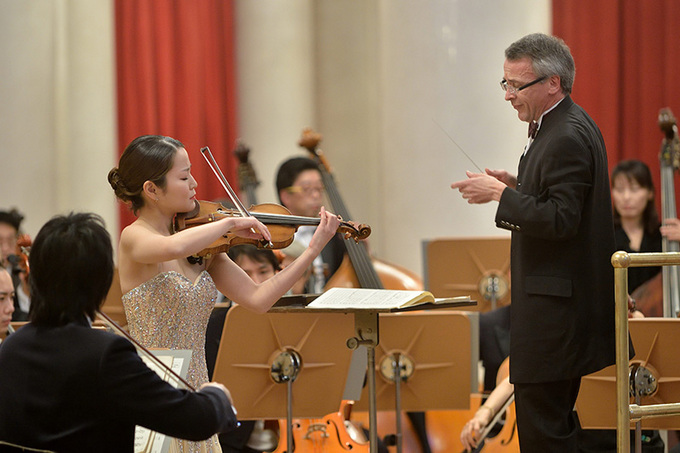
(Left) Mayuko Kamio, (Right) Pascal Verrot, Chief Conductor of the Sendai Philharmonic Orchestra
The latter half of the program consisted of two works by Claude Debussy, Nocturnes and La mer--Trois esquisses symphoniques pour orchestre. In "Sirènes", the third movement of the Nocturnes, the Miyagi Sanjo OG Choir delighted the audience with their beautiful voices. The choir, who travelled to Russia with the SPO, also sang the song "Furusato (Hometown)" in the encore.
When it was over, they received a huge standing ovation. The applause became louder when the orchestra members held up banners expressing appreciation for Russia's support in the aftermath of the quake and tsunami. It was a truly moving finale, with some members on the stage dabbing their eyes. Of all the classical concerts I have been to--not only of the SPO but of other orchestras and groups--this was the first time I actually came close to tears.
A Russian audience member commented that the performance was fantastic and that it conveyed the special feelings of the orchestra. Eiichi Nagashima, President of the Sendai Philharmony Club, an SPO fan club, said he especially liked La mer, which not only had dynamic tones but also contrasting melody and a great sense of scale.
On March 30 the tour moved to Moscow. The SPO presented the second of the two programs they had prepared, which started with Edward Elgar's No.9 "Nimrod" from Variations on an Original Theme "Enigma." The slow, lyrical variation offered consolation, comfort and prayers. The next piece from the opera Carmen by Georges Bizet was followed by Yuzo Toyama's Rhapsody for Orchestra. The percussion section took center stage in this suite, a combination of famous Japanese folk tunes which powerfully portrayed the enthusiasm and commitment of the people working hard to rebuild their lives.
The final piece in the program was Dvorak's Symphony No. 9, From the New World. Love for one's home is universal to the entire world. This belief led Pascal Verrot, Chief Conductor of the SPO, to select this work. I imagine he wanted to let people know that many in Japan are still suffering from the consequences of the disasters, such as those forced by the tsunami or by the Fukushima nuclear power plant accident to leave the communities where they'd been born and raised. Listening to the melody the sense of longing for home resonated in my heart.

(Bottom left) Pascal Verrot, Chief Conductor of the Sendai Philharmonic Orchestra, wielding the baton
On the second day in Moscow on March 31, they gave the final performance of the tour. Before the doors opened for the general audience, the string quartet performed for the children invited from a local orphanage. The program performed this evening was the same as in St. Petersburg and the harmonious yet powerful performance drew resounding applause.
During all the three performances, the concert hall lobby was lined with large panels containing pictures and newspaper articles, accompanied by Russian translation, about the disaster-hit areas. Many people stopped by to observe the panels with interest.
On April 1, some of the orchestra members visited Moscow School 1959, which is equivalent to a Japanese elementary, middle and high school combined. The children of the school had sent Japan a senbazuru, a mobile made up of a thousand folded paper cranes, with their wishes for a swift recovery from the disaster. The orchestra returned the kindness with performances of the string quartet, the woodwind quintet and percussion.
Having concluded the Russia tour, Verrot expressed satisfaction with the three performances, saying, "Despite having to perform in unfamiliar venues and in front of unfamiliar audiences, the orchestra gave a fine performance in a prestigious concert hall that has seen many great musicians playing on its stage." He attributed the achievement to the orchestra's success in striking the right balance between the power to concentrate and the ability to remain calm and relaxed. "We succeeded in engaging the audience with our music because we had both: the ability of concentration and the sense of calm," emphasized Verrot, adding, "Our experience in Russia and the huge applause we received will be a precious asset in the future."
Along with the orchestra, the Miyagi Sanjo OG Choir made an impact on stage. It is composed of graduates of Miyagi Prefecture Third Girls High School (currently called Miyagi Prefecture Sendai Sanou High School) which boasts an excellent chorale capable of holding its own even at the national level. "We've had the opportunity to visit Russia twice before on a choir group exchange program, and this was our third visit," said the choir's tour leader, Miwa Chiba. "I still got very nervous and worried about what the audience would think of us. I was so happy when they gave us a big round of applause at the end."

Miyagi Sanjo OG Choir singing in beautiful harmonies
Formed initially as an amateur community orchestra in 1973, the SPO celebrates its 40th anniversary in 2013. Its deputy director Yoshikazu Kataoka, who played an active part in the ensemble's founding and has been closely involved ever since, looked back at the Russia tour and remarked, "Thanks to the concert halls with superb acoustics and the warm and welcoming audience, the members were able to perform at their best without succumbing to pressure. I believe we succeeded in expressing gratitude to the people of Russia on behalf of our fellow Japanese." He went on to say that the tour proved an invaluable experience that provided an opportunity of musical growth for the SPO, as regional orchestras rarely get the chance to perform abroad.
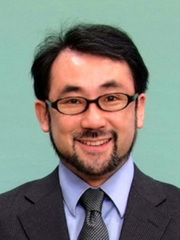 Shuntaro Kanno
Shuntaro Kanno
Reporter, Culture & Lifestyle News Section of Kahoku Shimpo Publishing Company
Born in 1967, Kanno joined Kahoku Shimpo, based in Sendai, in 1992. He covered music news in the arts and cultural section, where he was assigned for two years from 1997. Kanno assumed his current position in 2012, after having worked in various departments including the Miyako branch, news section, evening news editorial section and Aizu Wakamatsu branch. He is once again in charge of music news and is covering the activities of the Sendai Philharmonic Orchestra.
Keywords
- Music
- Natural Environment
- Peacebuilding
- Japan
- Russia
- Great East Japan Earthquake
- Kahoku Shimpo Publishing Company
- Sendai Philharmonic Orchestra
- St. Petersburg
- Moscow
- Sendai
- Ishinomaki
- Yuri Temirkanov
- Toru Takemitsu
- Pyotr Ilyich Tchaikovsky
- Mayuko Kamio
- Orchestra
- Claude Debussy
- Miyagi Sanjo OG Choir
- Classical music
- Edward Elgar
- Georges Bizet
- Yuzo Toyama
- Antonin Dvorak
- Pascal Verrot
- Fukushima daiichi nuclear power plant accident
Back Issues
- 2025.11.14 Stories from Both Si…
- 2025.10.24 Dialogue through Ani…
- 2025.6. 9 Creating a World Tog…
- 2024.10.25 My Life in Japan, Li…
- 2024.5.24 The 50th Japan Found…
- 2024.5.24 The 50th Japan Found…
- 2024.5. 2 People-to-People Exc…
- 2024.5. 2 People-to-People Exc…
- 2023.12. 7 Movie Theaters aroun…
- 2023.6.16 The 49th Japan Found…



